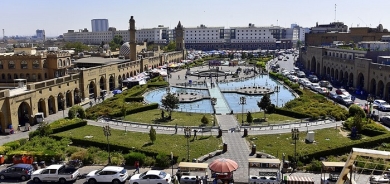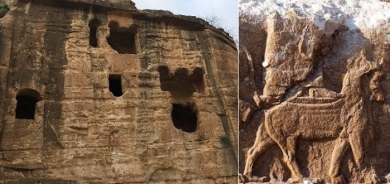Iraqi VP Hashimi denies any involvement in 150 terrorist operations

Hashimi, who is currently living in the country’s northern semi-autonomous region of Kurdistan, denied links to terrorist operations, saying that it is possible perhaps one of his security guards was involved.
He said he could not verify the “honesty” of his security guards after their confessions that they received orders from him personally to carry out target terrorist operations.
Late January, Iraqi security forces detained 16 of Hashimi’s bodyguards.
Local and international observers said that the Iraqi government cannot base charges against Hashimi on mere confessions from his bodyguards; especially since some of the arrested security guards looked as if they had been beaten during their confessions of their accounts on Iraqi TV channels.
On Friday, Iraqi courts said that the fugitive vice president and his security guards were involved in 150 terrorist operations against citizens.
Abdul Sattar al-Beer Qadar, representative of the country’s Higher Judicial Council, said that Hashimi and his security guards were involved in 150 terrorist operations including suicide bomb blast against visitors of Al-Imam Al-Kadhim mosque in Adhamiya in 2010, assassination of an the Iraqi actor Waleed Ja’aaz in 2006, targeting Iranian Shiite pilgrims in the country’s holy shrines, as well as citizens, doctors, lieutenants and military officers.
Late January, a source close to the government of Kurdistan said that there were unconfirmed reports that Hashimi had disappeared from the villa that he was staying in, making his whereabouts hard to trace. Another source said that there was a discussion on whether Hashimi had fled to either Turkey or Iran.
In January, Turkish Foreign Minister Ahmet Davutoglu, said Ankara would not turn Hashimi away if he requested asylum, but said he should stay in Iraq.
Meanwhile, Hashimi’s Sunni-backed yet secular Iraqiya List objected on Friday to a proposal that the country’s Vice Prime Minister Salih al-Mutlaq fill the position of the fugitive vice president, describing the suggestion as an “immoral” transaction. Iraqiya Party said it cannot happen before the closure of Hashimi’s case.
On December, 2011, Hashimi was charged with running a death squad, and later rejected the opportunity to head to Baghdad to stand trial.
Early in January, Hashimi said that the charges being set against him were of a “sectarian nature” and were used as a ruse to get rid of him. Warning of sectarian consequences in the conflict-torn country, the wanted vice president said that he would only stand for trial in the Kurdish autonomous region as opposed to Baghdad, as it is independent from the country’s Prime Minister Nouri al-Maliki’s grip.
“The Iraqi judicial council is under the control and the influence of the central government, and this is a big problem,” Hashimi said. “That is why I asked to move the case to Kurdistan. ... Justice here will not be politicized.”
The warrant against Hashimi has been the focus of a political row between Shiite al-Maliki and the Sunni-backed Iraqiya bloc, which is a part of his national unity government and of which Hashemi is a member.
The political row between the country’s two main alliances started at the end of 2011, right after the withdrawal of the U.S. troops from Iraq.
(Al Arabiya)














